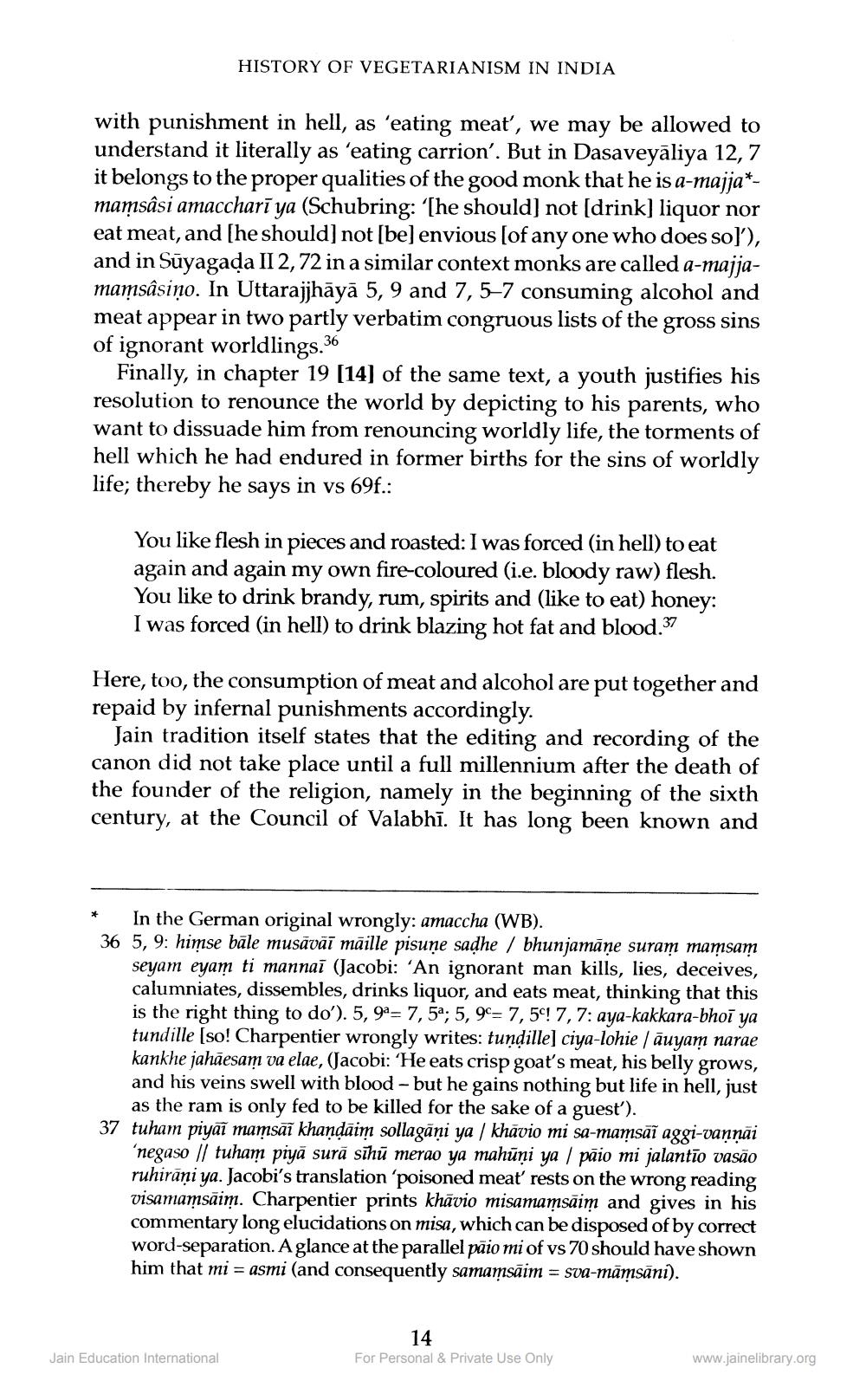________________
HISTORY OF VEGETARIANISM IN INDIA
with punishment in hell, as 'eating meat', we may be allowed to understand it literally as 'eating carrion'. But in Dasaveyāliya 12,7 it belongs to the proper qualities of the good monk that he is a-majja*mamsâsi amaccharī ya (Schubring: '[he should) not (drink] liquor nor eat meat, and she should] not [be] envious (of any one who does so]'), and in Süyagada II 2,72 in a similar context monks are called a-majjamamsâsiņo. In Uttarajjhāyā 5, 9 and 7,5–7 consuming alcohol and meat appear in two partly verbatim congruous lists of the gross sins of ignorant worldlings.36
Finally, in chapter 19 (14) of the same text, a youth justifies his resolution to renounce the world by depicting to his parents, who want to dissuade him from renouncing worldly life, the torments of hell which he had endured in former births for the sins of worldly life; thereby he says in vs 69f.:
You like flesh in pieces and roasted: I was forced (in hell) to eat again and again my own fire-coloured (i.e. bloody raw) flesh. You like to drink brandy, rum, spirits and (like to eat) honey: I was forced (in hell) to drink blazing hot fat and blood.37
Here, too, the consumption of meat and alcohol are put together and repaid by infernal punishments accordingly.
Jain tradition itself states that the editing and recording of the canon did not take place until a full millennium after the death of the founder of the religion, namely in the beginning of the sixth century, at the Council of Valabhī. It has long been known and
In the German original wrongly: amaccha (WB). 36 5,9: himse bāle musāvāī māille pisune sadhe / bhunjamāṇe suram mamsam
seyam eyam ti mannai (Jacobi: 'An ignorant man kills, lies, deceives, calumniates, dissembles, drinks liquor, and eats meat, thinking that this is the right thing to do'). 5, 9a-7, 52, 5, 90= 7,5€! 7, 7: aya-kakkara-bhoi ya tundille (so! Charpentier wrongly writes: tundille] ciya-lohie / āuyam narae kankhe jahāesam va elae, (Jacobi: He eats crisp goat's meat, his belly grows, and his veins swell with blood - but he gains nothing but life in hell, just
as the ram is only fed to be killed for the sake of a guest'). 37 tuham piyai mamsāĩ khandaim sollagāni ya / khavio mi sa-mamsāí aggi-vannai
'negaso || tuham piyā surā sīhū merao ya mahūņi ya / paio mi jalantīo vasão ruhiraņi ya. Jacobi's translation 'poisoned meat' rests on the wrong reading visamamsăim. Charpentier prints khāvio misamamsaim and gives in his commentary long elucidations on misa, which can be disposed of by correct word-separation. A glance at the parallel põio mi of vs 70 should have shown him that mi = asmi (and consequently samamsaim = sva-māmsāni).
14
Jain Education International
For Personal & Private Use Only
www.jainelibrary.org




